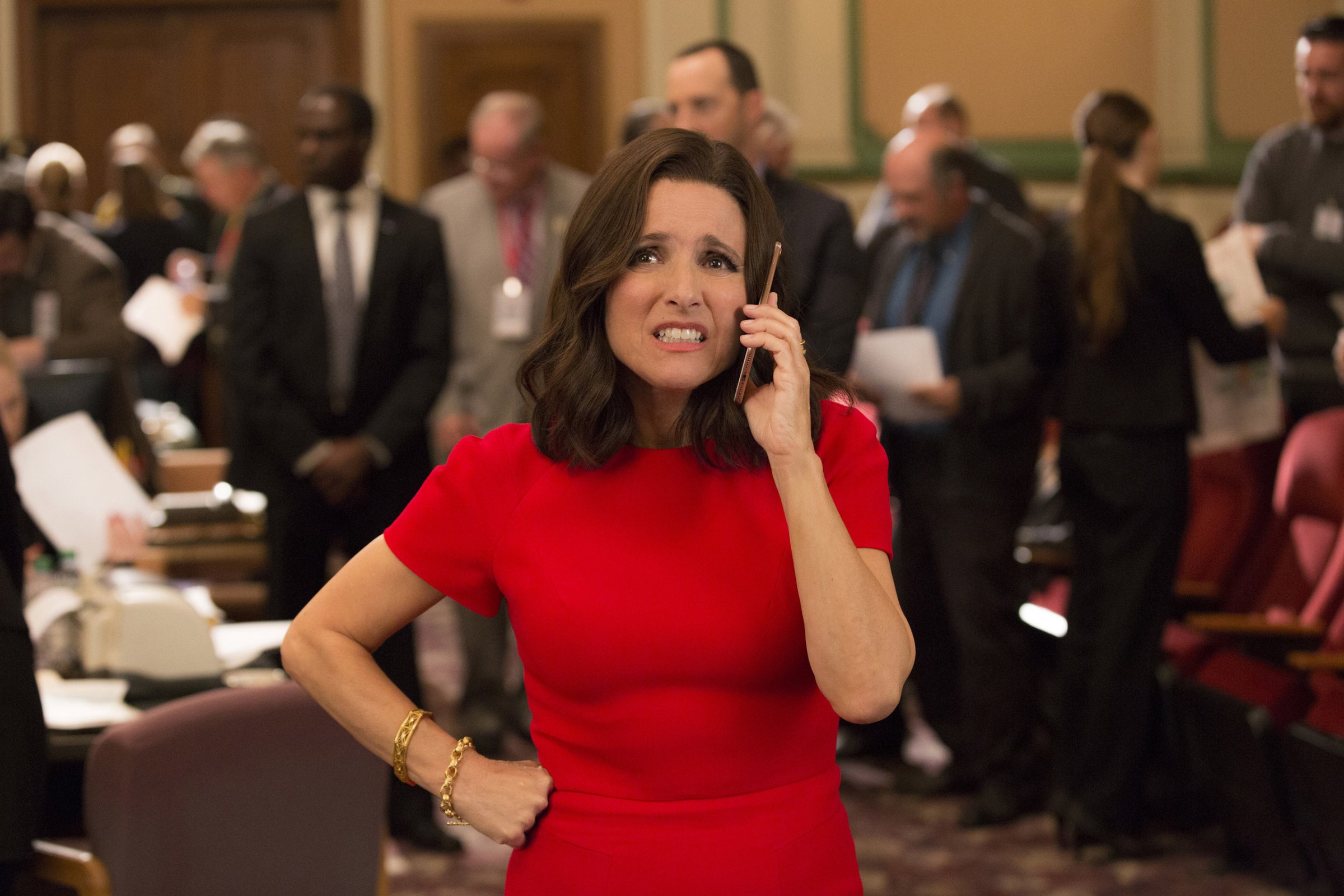
It’s always seemed a bit pointless to try and map onto Veep one-to-one connections with real-world politicians. The show’s very point is that Selina Meyer (Julia Louis-Dreyfus) is always thwarted in her attempts to enact policy— has no real ideology besides—so her party doesn’t matter and is never mentioned. The show exists in a world whose only relation to our own is the endless appetite for more power among those who have a little of it.
And yet extraordinary coincidences have forced on Veep the mantle of being, somehow, about the present day. Given the pace and tenor of coverage of President Trump’s chaotic first months in office, the show’s past seasons feel relevant. But the show’s sixth season, debuting April 16, doesn’t take place within the corridors of power at all. It’s about the disempowerment of a woman politician who believed she was going to cement her legacy by winning the election, and it’s one of the most daring, and accidentally relevant, narrative turns the show has taken.
The show has long been all about change, reshuffling the deck at the end of each season, but this feels like a more jolting change than most. Meyer is now an ex-president, having served less than a year and with next-to-no accomplishments to her name; she is, though, obsessed with at the very least redeeming her legacy as a spreader of democracy and, possibly, running again. As she moves through the world, she’s an object of scorn and some pity; she’s forced to beg for money from unsavory, self-interested foreign parties to fund her foundation (one with nebulously defined goals) and to fly commercial, where the citizens she once governed gawk at her incredulously. Her aides have, in many cases, moved on to other things; when a group of ex-presidents convene for a photo, she’s placed with the first ladies.
Given how much the show has avoided commenting on politics in past, it’s surely coincidental that so much of Selina’s story in the new season feels like a grab bag from the recent life of Hillary Clinton, less in terms of specifics than mood. (There’s a difference in degree, perhaps: Meyer’s post-election blues were a bit too vivid to be cured by walking in the woods, we learn.) Like Meyer, Clinton is in an challenging position, subject to all the intrusiveness of the public a national politician endures as part of the job, without any of the power associated with the presidency.
What Veep makes brilliantly clear is that a campaign doesn’t need to have an object in mind in order to be a campaign. Politicians are perpetually selling themselves, including after elections don’t go their way; the race continues endlessly, with nothing particular in mind. This show perfectly captures the extra indignity of having to continue to shore up one’s reputation immediately after rejection by the voters—and the masochism of continuing to do so. It’s impossible to fathom not continuing the endless campaign, and yet whatever was its point has long since been lost. A morning-show interview in which Selina projects fake positivity (she’s, you know, okay with her loss!) gets it exactly right. That she must be extra sunny to avoid alienating the public on account of her gender doesn’t even need to be remarked upon. Louis-Dreyfus’s performance, burbling with rage under the surface, says it all.
Certain aspects of this reshuffle—namely the new roles taken on by Dan (Reid Scott) and Amy (Anna Chlumsky) don’t work. Neither is in a plotline that makes much sense or is, yet, terribly funny, although credit is due the show for being brave enough to strip them away from their ex-boss. After all, why would they work for a politician who only used to be powerful?
That’s the genius of Veep‘s new season. Every previous season of the show was seeded with potential: She’d succeed the president and take office, or she’d win re-election, or she’d prevail in the lengthy court battle over the election. There is nothing left to strive for—save a scenario whereby she emerges to run again in four years, which, brutally, only she believes is possible. Selina is utterly herself, one of TV’s most brilliantly conceived egotists ever. And yet her disempowerment sheds new light on the plight of the election loser. Four years until the next go-round isn’t that far away—and yet coming back from being publicly perceived as a loser is no easy feat. But, with a tight, confused smile on her face as she walks down a commercial jet’s aisles, Selina fights on, because it’s all she knows how to do. It’s great comedy, but maybe better tragedy.
More Must-Reads From TIME
- The 100 Most Influential People of 2024
- Coco Gauff Is Playing for Herself Now
- Scenes From Pro-Palestinian Encampments Across U.S. Universities
- 6 Compliments That Land Every Time
- If You're Dating Right Now , You're Brave: Column
- The AI That Could Heal a Divided Internet
- Fallout Is a Brilliant Model for the Future of Video Game Adaptations
- Want Weekly Recs on What to Watch, Read, and More? Sign Up for Worth Your Time
Contact us at letters@time.com